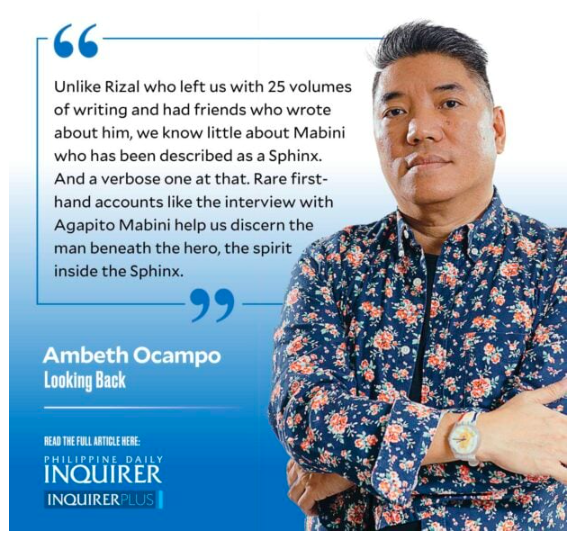Mabini up close
Apolinario Mabini died in his brother’s home in Nagtahan in 1903. The wooden house with a nipa roof, now a national shrine, has been moved a number of times. First, from one bank of the Pasig to the other to give way to the expansion of Nagtahan bridge; second, from the Presidential Security Group compound across the Malacañang complex to make way for dredging of the Pasig and the widening of the riverbank. Today, it now stands in the Polytechnic University of the Philippines Mabini Campus. Most historic shrines are tied to a specific location, but in the case of the “Mabini House,” the history and heritage go wherever the physical structure is located.
In 1927, a journalist from The Independent interviewed Agapito Mabini in what he described as a “casita de nipa” that was short, but with ample space and rooms. Although Mabini was paralyzed for a long time, his death was due to cholera and not syphilis, a nasty rumor his detractors spread behind his back. According to Agapito, his brother lived and died a Mason. Well-meaning friends and relatives wishing to spare Apolinario from the fires of hell affectionately tried to wean him from masonry and return him to the fold of the Catholic Church. To all this, Apolinario affectionately replied that he had no need to return to the church or to churchmen since he had confessed directly to God all sins he had committed in his lifetime. Agapito related that when Apolinario woke up at dawn, and before he retired at night, he worshipped God quietly, intimately.
The day before his death on May 13, 1903, he asked his brother to get him a cedula or residence certificate to be used for the paperwork needed even if he had no estate, no income, nothing to leave his family but a good name and reputation. When Agapito returned with the cedula, Apolinario was ill and he expired the next day. He left them with nothing, not even a cent, and they were lucky that people contributed to defray the costs of his funeral. Mabini’s funeral was well attended, even if it fell during a cholera epidemic and there were all sorts of restrictions on public gatherings and movements.
Agapito narrated that Mabini scribbled a lot in his last years. This makes me wonder if all of these papers were conserved and if everything he wrote in retirement has been made available to historians. Apolinario never talked politics with his family but spoke politics all the time with friends and frequent visitors like Ariston Bautista, Dominador Gomez, and Arcadio del Rosario. He also spoke politics with others who visited less frequently like United States Gen. Franklin Bell. Apolinario spoke softly, in a low voice so people could not eavesdrop on the conversation. With Agapito, they spoke about family matters and only once about Emilio Aguinaldo of whom he spoke very badly. Aguinaldo was described as delusional and naive, a man miserably duped by both the Spaniards and the Americans.
Mabini also stated that Aguinaldo was responsible for the deaths of Andres Bonifacio and Antonio Luna. This was no secret, and he had referred to it in his memoirs “La Revolucion Filipina.” He admired Rizal a great deal. Del Rosario brought him books regularly and he preferred reading philosophy and history, particularly books on the French Revolution. The first thing Apolinario read upon rising from bed was the daily newspaper. Pages of the newspapers were scattered all over the living room.
Apolinario Mabini dressed simply because he didn’t have good clothes. He preferred clothes made from native cloth, like those spun in Ilocos. The only imported item he had in his wardrobe was a black suit. He wore shoes from Marikina.
Apolinario died a bachelor, he had no children. His only love (la unica aventura amorosa) was a woman from Malabon whom he didn’t marry because he didn’t think her worthy. Despite being a bachelor, he loved talking to children, playing games with them, and giving them advice. He had no vices except that he liked to eat a lot.Unlike Rizal who left us with 25 volumes of writing and had friends who wrote about him, we know little about Mabini who has been described as a Sphinx. And a verbose one at that. Rare first-hand accounts like the interview with Agapito Mabini help us discern the man beneath the hero, the spirit inside the Sphinx.
Comments are welcome at [email protected]
Disclaimer: The comments uploaded on this site do not necessarily represent or reflect the views of management and owner of Cebudailynews. We reserve the right to exclude comments that we deem to be inconsistent with our editorial standards.

